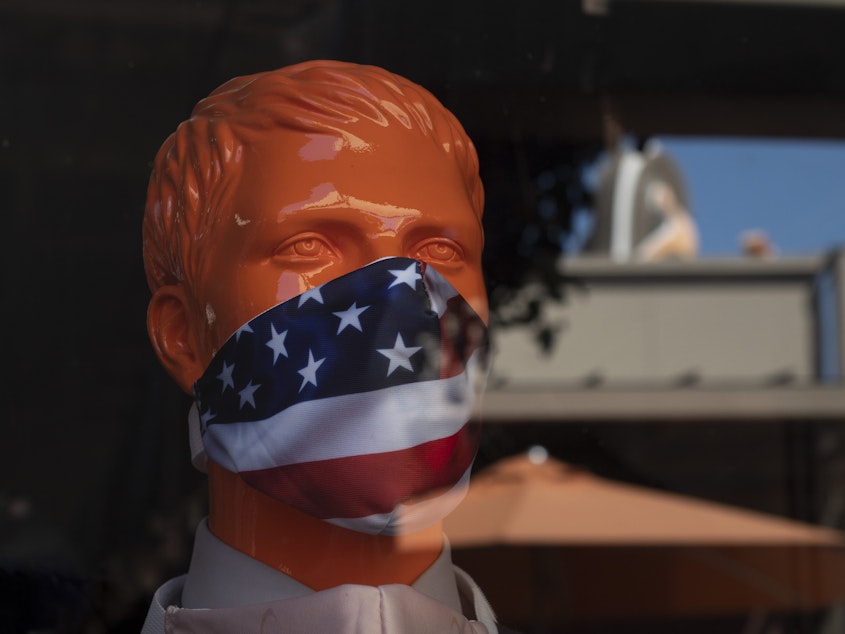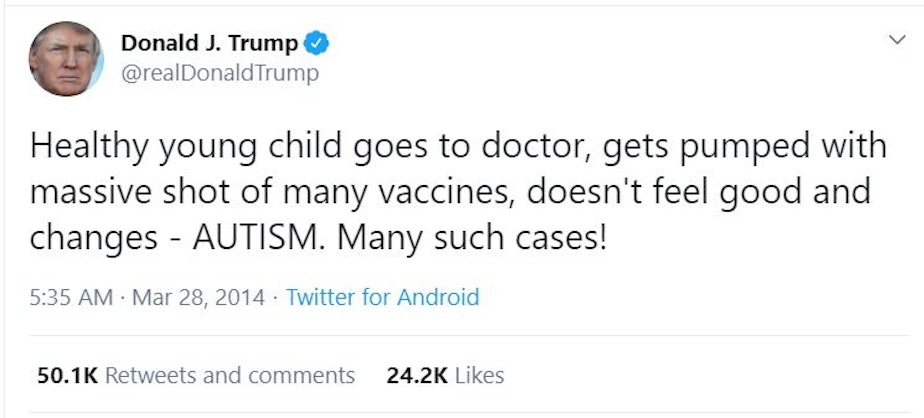Politics vs the pandemic: Are anti-maskers like anti-vaxxers?

Loren Culp, a police chief in the town of Republic Washington, has called the state’s mandatory mask-wearing order “a bunch of crap” and “tyranny.” He's one of several Republicans running against Governor Jay Inslee who reject mandatory mask-wearing, despite scientific evidence that it can prevent the spread of the cornonavirus.
Is the rejection of masks by Republican candidates another case of the politicization of science, as we’ve seen with vaccines and climate change?
Puyallup City Council member Cyndy Jacobsen is running as a Republican for an open state House seat in the 25th Legislative District. She too sees the mandatory mask order as a violation of personal freedom.
But Jacobsen is also skeptical about the science.
“I honestly think the evidence doesn't support that we all need to be wearing the masks,” she said.
Jacobsen’s also against tougher new state rules that require kids to be vaccinated when they start public school.
“There are some very good arguments on the side of limiting these vaccines," she said.
Sponsored
Ann Bostrom, who studies risk communication and environmental policy at the University of Washington, said there are striking parallels between anti-maskers and people who are vaccine hesitant.
“It's hard to keep up with the science on coronavirus, which is unfolding at a very rapid rate," she said. "There's just new evidence on the effectiveness of masks just in the last couple of weeks. And same thing with new vaccines when the science on that is evolving."
In addition, Bostrom said, it doesn't help that public health officials' messages about the value of mask changed as more information became available.
Nives Dolšak, who studies science and public policy at the University of Washington, does not see strong parallels between oppositions to masks and the anti-vaccination movement. She said with masks, the "core" issue is "how much are we willing to curtail our liberty and our freedoms for a successful curtailment of the public problem?”
In other words, according to Dolšak, opposition to mask wearing is about more Conservative ideology than skepticism about the science.
Sponsored
Assem Prakash, a UW political science professor who studies climate change communication, agreed.
“There is a very small subsection that questions the use of masks and whether masks are effective. But I don't think that's the dominant narrative in the Republican Party,” Prakash said
He said in that sense, coronavirus politics is very different from the politics of climate change, where there is widespread skepticism about the science.
When the virus first hit, some Republicans did try the same “anti-science playbook” they used on climate change. Rush Limbaugh, for example, compared the coronavirus to the common flu.
Sponsored
But those skeptical messages didn’t stick, Prakash said, because the threat of this virus is less abstract than climate change.
Over 130,000 are dead due to the virus, and a recent Economist / YouGov poll found that around two-thirds of Americans are worried about getting Covid-19. There are also high levels of support for medical scientists and public health officials like Dr. Anthony Fauci, the head of the National Institute of Allergy and Infectious Diseases, who has been a key spokesman for the government during the crisis.
“It is a kind of support one used to see for some military commanders,” Prakash said.
Nationally, more Republican leaders have started to wear masks and speak in favor of mask wearing, because they realize the political consequences of a "response that's incompetent are going to be very serious,” Prakash said.
Republican Senator Lamar Alexander of Tennessee, for example, told CNN he wished “President Trump would wear a mask when it's appropriate because millions of Americans admire him and would follow his lead.”
Sponsored
Even President Donald Trump has started to change his tune about masks, sort of, saying in a recent interview that he’d have “no problem” wearing a mask. “
"Actually, I had a mask on. I sort of liked the way I looked…like the Lone Ranger,” he said.
Although, Trump continues to not wear a mask in public, and was himself an anti-vaxxer as recently as 2014.
Sponsored





